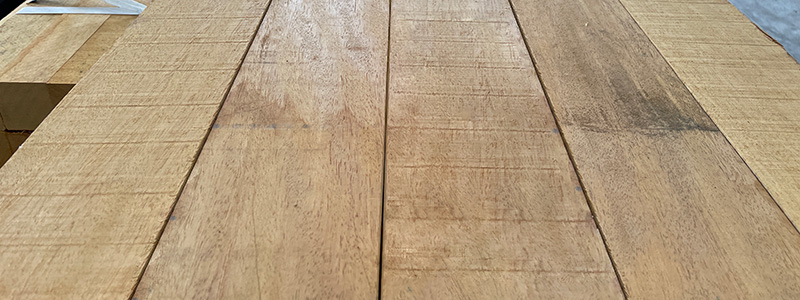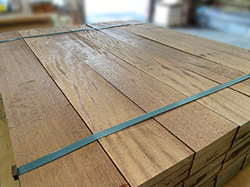Opepe Wood Suppliers
Opepe timber (also known as Bilinga and Aloma) is a colourful timber raging from golden to orangey yellow.
Although not as strong as some of its tropical counterparts, like Ekki and Greenheart, Opepe is still used frequently in marine and constructional environments.

Send Through Your Opepe Enquiry
Opepe Timber
Opepe, sometimes called Bilinga, is tropical timber often used in place of the benchmark extreme hardwoods: Greenheart and Ekki, where a more easily workable timber is required but without sacrificing much strength.
Comparitive to Ekki at 1070kg/m3, Opepe is 750kg/m3, yet despite being approximately 70% as dense as Ekki, Opepe performs 90% as well in stiffness and crushing strengh and 80% as well in bending strength.
These properties coupled with its relatively good stability for a marine timber make it popular in bridge/commerical decking and other machined products in heavy duty marine environments.
How does Opepe compare to Oak?
Oak is a highly used durable construction timber but when you just need something with a little more strength and marine resistance, Opepe is a strong contender. Oak has a very similar density of 720 kg/m3 yet Opepe achieves 15% higher bending strength, 35% higher crushing strength and 20% higher stiffness. Not to mention its exceptional resistance to marine borers and decay matching that of Greenheart and Ekki.
The timber is available in section sizes up 500mm x 500mm and in lengths up to 9m subject to availability. We can usually supply Opepe within 15-20 working days however this will be confirmed upon quotation, please use the above enquiry form to send through your cutting list and we’ll get back to you with a quote.
More about the tree itself
The tree stands at around 35m-48m tall when fully grown and can be up to 2m in diameter. Generally, the trunk of the tree has few buttresses, but old trees can have basal swelling that swell over 1m above the ground.
Opepe is distributed across Africa in Equatorial Guinea, Liberia, ivory Coast, Ghana, Cameroon and Nigeria. Not listed in the CITES appendices and only listed as near threatened in the IUCN Red list, Opepe is popular when sustainability is a concern.







 Main Menu
Main Menu


